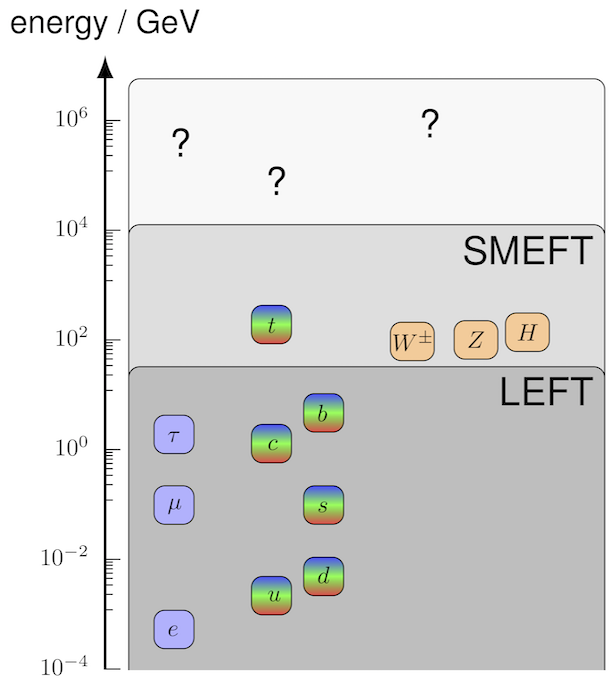Research

Despite its success, the Standard Model (SM) of particle physics fails to explain certain observations, such as the baryon asymmetry in the universe, dark matter, or neutrino masses. We are interested in indirect searches for physics beyond the SM, conducted in low-energy experiments at very high precision. These observables pose interesting theoretical challenges concerning the model-independent description of effects beyond the SM, as well as non-perturbative effects due to the strong nuclear force.
Effective field theories
Provided that physics beyond the SM consists of heavy particles, their indirect quantum effects on low-energy observables can be described in a model-independent way in terms of effective field theories, which are the SMEFT above and the LEFT below the electroweak scale. Our work aims at the extension of these theories to higher orders and the consistent inclusion of threshold effects.
Publications
CP and lepton-flavor violation
Beyond-the-SM sources of CP or lepton-flavor violation are probed up to very high scales by searches for electric dipole moments or lepton-flavor-violating decay processes, e.g., in the upcoming n2EDM and Mu3e experiments at PSI. We are interested in non-perturbative effects that affect these observables at low energies. Their description is based on effective field theories and usually requires input from lattice QCD.
Publications
Links
Hadronic contributions to the muon anomalous magnetic moment
The current SM prediction of the anomalous magnetic moment of the muon has been summarized in the 2025 white paper of the Muon g-2 Theory Initiative (an update of the 2020 white paper). The theoretical uncertainty is dominated by hadronic contributions, i.e., effects of the strong interaction, in particular hadronic vacuum polarization (HVP) and hadronic light-by-light scattering. The white-paper prediction agrees with the current experimental value, which is dominated by the E989 experiment at Fermilab. However, discrepancies exist between lattice-QCD and data-driven dispersive evaluations of HVP, which are not yet understood. Improved predictions for the hadronic contributions thus remain the focus of ongoing research efforts.